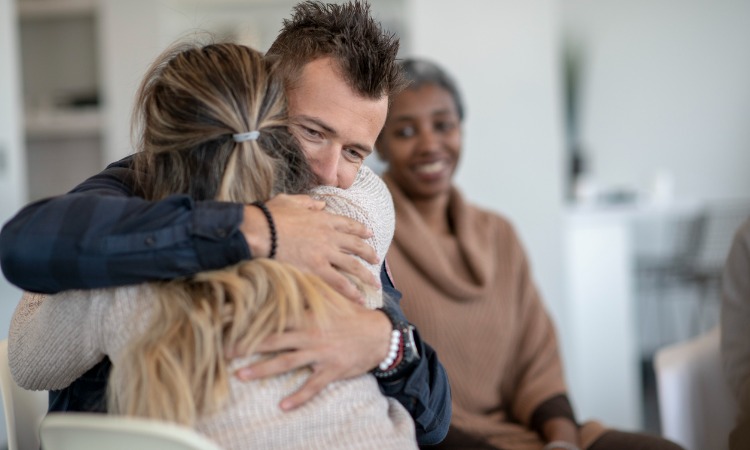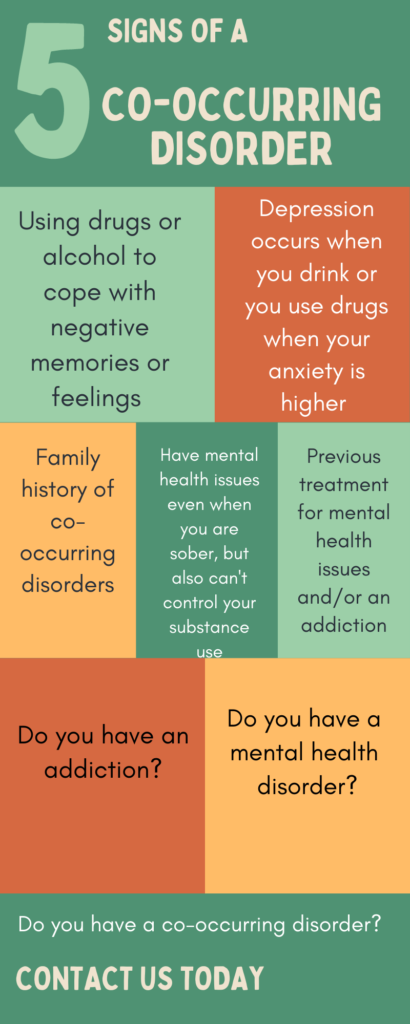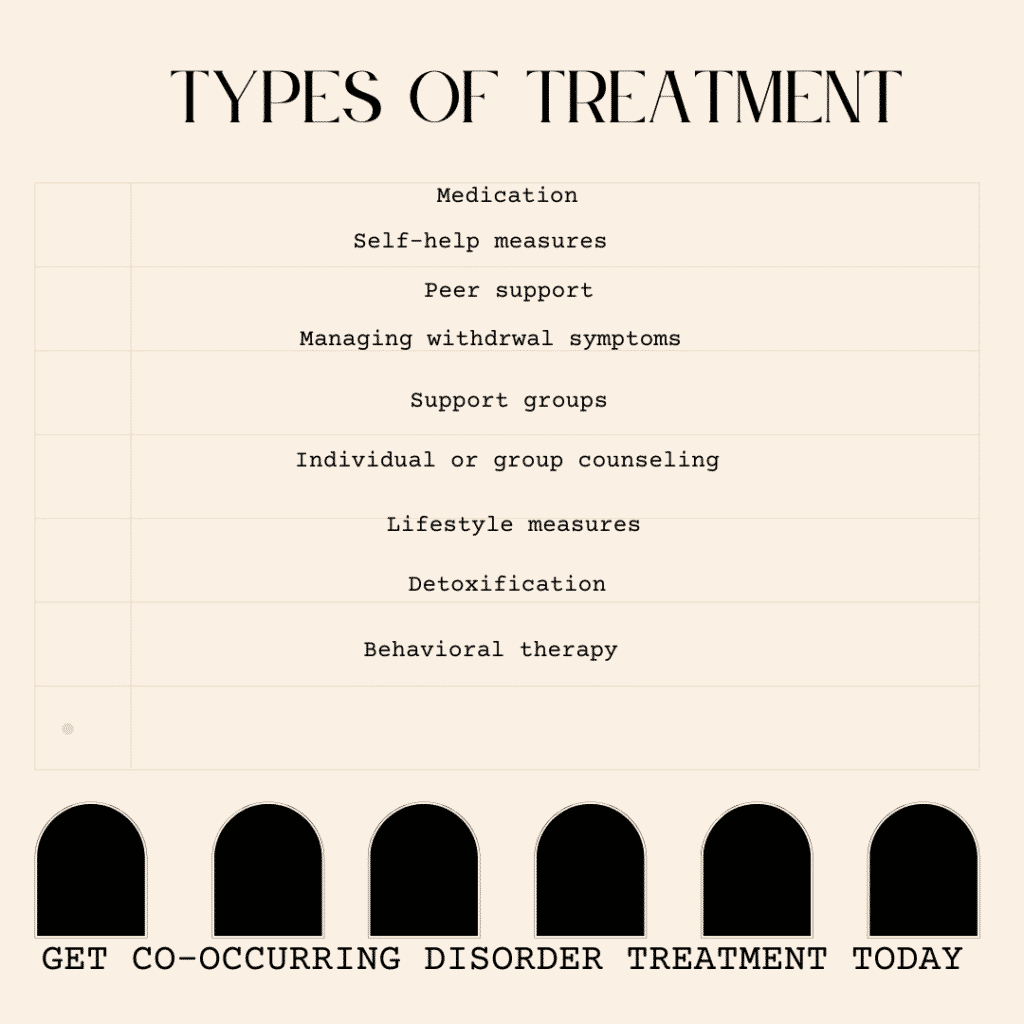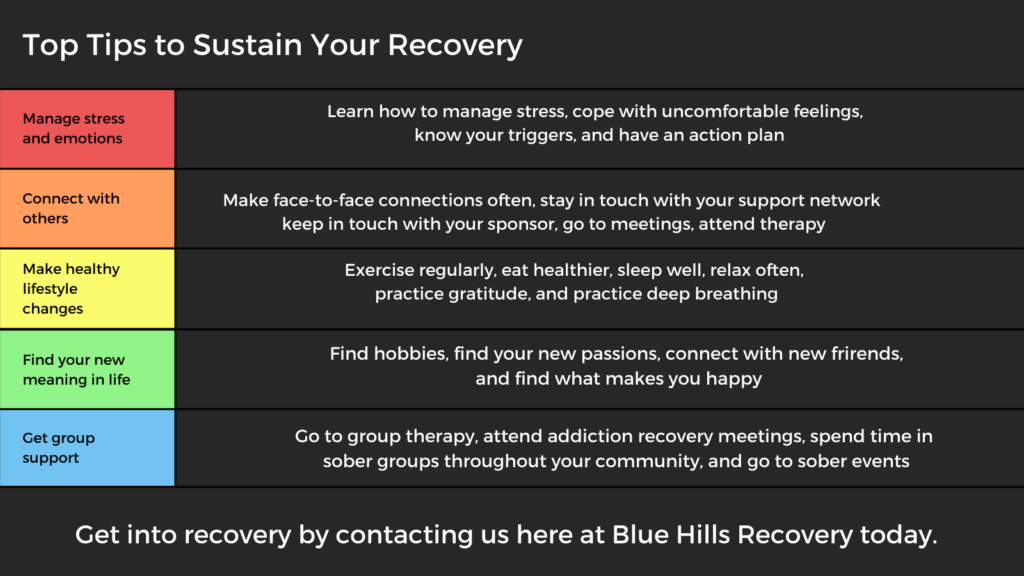

Table Of Contents
- The Link Between Addiction and Mental Health Issues
- What Happens First – The Addiction or Mental Health Disorder?
- How Is a Co-Occurring Disorder Recognized?
- Denial and Co-Occurring Disorders
- Signs and Symptoms of Substance Abuse or Addiction
- Symptoms/Signs of Co-Occurring Disorders
- Getting Co-Occurring Disorder Treatment
- How to Get Into the Best Treatment Program
- Tips for Sustaining Your Recovery
- How Can You Help Your Loved One or Friend with a Co-Occurring Disorder?
- Get Help for Mental Health Disorders and Addictions Today
Are you dealing with addiction and a co-occurring disorder? Whether that is an anxiety disorder, depression, PTSD or other mental health issues, as well as an addiction, there are ways to overcome it all. Learning more about the link between addiction and mental health issues is the first step. If you are all ready to get into an addiction or mental health treatment program, reach out to us here today at Blue Hills Recovery.
The Link Between Addiction and Mental Health Issues
When someone has both an addiction and a mental health condition such as bipolar disorder or anxiety, it is known as a co-occurring disorder. Sometimes, it is also called a dual diagnosis. Dealing with addictions is not easy. It makes it even more difficult when someone has mental health issues.
With co-occurring disorders, the addiction and mental health issues each have their own symptoms that affect the person’s lifestyle. Sometimes, they affect work, home life, communication, relationships and much more. To make things even worse, the disorders and addiction affect one another – making the other more severe. For example, if someone has an untreated mental health disorder, the addiction often gets worse. If they have an untreated addiction, the mental health issues usually worsen.
Co-occurring disorders are much more common than a lot of people know. Studies show the following:
- Approximately ½ of the adults in the United States have a severe mental health issue and an addiction
- Around 40% of alcoholics and 50% of drug addicts have at least one serious mental health issue
- Out of every person who is diagnosed with a mental health illness, around 30% of them abuse drugs or alcohol
It is vital that everyone knows they can get treatment for both an addiction or mental health disorder. If you have both of these, you can get co-occurring disorder treatment, as well. There are so many things you can do with your life. You don’t have to keep suffering through an addictive lifestyle when recovery is possible.
What Happens First – The Addiction or Mental Health Disorder?
Addictions and mental health disorders such as anxiety and depression are often linked with one another. Although, it is important to know that one of them doesn’t always cause the other. With this being said, sometimes abusing drugs can cause mental health issues such as psychosis and abusing alcohol can worsen anxiety and depression. On the other hand, mental health issues such as depression can make alcoholism or drug addiction more severe, as well.
What is the connection between alcohol, drugs and mental health issues? For one thing, drugs and alcohol are used often to self-medicate mental health disorder symptoms. In addition, substance abuse can aggravate an underlying mental health disorder.
If you have an addiction, mental health condition or co-occurring disorder, reach out to our team here at Blue Hills Recovery for help today.
How Is a Co-Occurring Disorder Recognized?
Sometimes, it is tough to recognize a co-occurring disorder. Part of the reason for this is that the symptoms that display as a mental health issue may just be symptoms of the addiction. In addition, the addiction may be self-medication for the mental health issues. Once those are taken care of, the person may not feel the need to abuse alcohol or drugs.
The symptoms and signs vary depending on what mental health issue or addiction a person has and how severe those are, as well. There are, however, some general signs that a person has a co-occurring disorder.
Denial and Co-Occurring Disorders
Denial is common in addictions and mental health disorders. It can be difficult to admit that you are dependent on drugs or alcohol or admit how much mental health symptoms are affecting your life.
Some people are ashamed to admit they need help to stop using alcohol or drugs. Others feel there is too much of a stigma surrounding mental health disorders to reach out for help.
Our Blue Hills Recovery team is here to tell you that you can get help. We are all here to support and guide you through the recovery process.

Symptoms/Signs of Substance Abuse or Addiction
No matter what substance someone is abusing – whether that be alcohol, recreational drugs or street drugs, there are going to be symptoms/signs of abuse or addiction. It basically boils down to the way the drug or substance affects the person’s body, mind or lifestyle.
To help a person recognize the signs of substance abuse or addiction, it would be a good idea to answer the questions down below. The more yes answers there are, the higher chance that a person has a substance use disorder or addiction.
- Have you thought you should stop drinking or quit using drugs?
- Did you need to drink more alcohol or take more drugs to get the same effects you got in the past?
- Have you attempted to stop drinking or using drugs, but didn’t or couldn’t stop or cut back?
- Have you lied about how much drugs or alcohol you use or drink?
- Do you go through prescription pain or anxiety medications quicker than you are supposed to?
- Has someone in your life expressed concern about your drinking or drug use?
- Do you ever feel guilty, bad, embarrassed, or ashamed about your drug or alcohol use?
- Have you said or done things when high or drunk that you regret later?
- Do you ever blackout when drinking?
- Do you get so high that you pass out or zone out?
- Has your drug or alcohol use caused problems for you in school, at work, or within your relationships?
- Have you gotten in trouble with the law due to your drug or alcohol use?
These are some of the symptoms/signs of substance abuse or addiction. If you can relate to one or more of these issues, don’t wait any longer to reach out for treatment. You can get help from our team, here at Blue Hills Recovery, today.
Symptoms/Signs of Co-Occurring Disorders
The primary mental health conditions that co-occur with addiction are anxiety disorders, bipolar disorder and depression. Learning about the common symptoms/signs of co-occurring disorders can help you to see that you aren’t alone.
Some of the common symptoms/signs of depression include:
- Feeling hopeless/helpless
- Losing interest in hobbies or daily activities
- Can’t experience pleasure or happiness
- Weight or appetite changes
- Sleep changes
- Losing energy easily
- Physical pain
- Concentration/focus issues
- Strong feelings of guilt or worthlessness
- Feeling like you have let your family and friends down
- Reckless behavior
- Angry outbursts/irritability
Some of the common symptoms/signs of anxiety include:
- Feeling jumpy or restless
- Excessive worries and/or tension
- Feeling on edge
- Short of breath and/or racing heart
- Dizziness, trembling, and/or nausea
- Headaches, tension, and/or muscle spasms
- Trouble focusing
- Insomnia
Some of the common symptoms/signs of bipolar disorder mania include:
- Extreme irritability
- Feelings of euphoria
- Increased energy
- Decreased need for sleep
- Grandiose, unrealistic beliefs
- Racing thoughts
- Rapid speech
- Hyperactivity
- Rage
- Anger
- Impaired judgment
- Impulsivity
Some other mental health disorders that often co-occur with addiction include PTSD, borderline personality disorder and schizophrenia.
Do you struggle with any of these symptoms/signs? Are you abusing drugs or alcohol to deal with them? If so, don’t wait another day to reach out for help. Our treatment center team is here to help you overcome both the addiction and mental health disorders.
Getting Co-Occurring Disorder Treatment
Most co-occurring disorders are treated using the integrated approach – where the mental health disorder and addiction are treated together. Whether your addiction or mental health disorder came first, your long-term recovery is based on whether you are getting the proper treatment for both of these disorders/diseases.
There are several types of treatment that you can get for co-occurring disorders.
Getting Into the Best Treatment Program

There are some tips that can help you to find the best treatment program for your mental health disorder and addiction. Some of these tips include:
- Find an accredited facility
- Find a treatment facility that offers evidence-based treatments
- Choose a treatment program that offers aftercare services, to help lower the risk of relapsing
- Find a treatment facility that offers co-occurring disorder treatment
- Find a treatment facility that lets you have a say in your treatment plan
- Find a facility that teaches healthy lifestyle and coping tips as part of the recovery program
There are many great addiction recovery programs. Here at Blue Hills Recovery, we have a variety of treatment programs that can help you to overcome both an addiction and mental health disorder. All it takes is that first phone call to start changing your life for the better. Don’t hesitate to reach out to our team today.
Tips for Sustaining Your Recovery
There are going to be challenges in your life after you leave the addiction and mental health rehab treatment center. However, with what you learn during your treatment program and in aftercare planning, you can continue your recovery for a long time.
There are some great tips for sustaining your recovery from the time you detox throughout your recovering lifestyle.

How Can You Help Your Loved One or Friend with a Co-Occurring Disorder?
Do you know someone who has an addiction and a mental health disorder? If so, it is important to know that they need your support. Yes, it may be causing you to feel like you are on a roller coaster, however, there is hope for the both of you.
Here at Blue Hills Recovery Center, we have treatments that can help them to overcome addiction and mental health disorders.
Remember, the best way to help your friend or loved one is to accept what you can do and let go of what you cannot do. For example, you can’t force them to get clean and sober. You can’t force them to change their lifestyle. However, you can let them know you care about them deeply and you want what is best for them. You can make a list of the treatments available and help them get into a program if they are ready to do so. You can attend support groups with your loved one or friend and get yourself the help you need to better understand their addiction or mental health disorder, too. Last, but not least, you can set boundaries and continue to educate yourself on the recovery process.
It is going to be a journey for the both of you, but there can be light, happiness and joy at the end of this tunnel.
Get Help for Mental Health Disorders and Addictions Today
Millions of people around the world have a problem with mental health disorders and/or addiction. So many of these people do have a co-occurring disorder which is an addiction and a mental health condition. If this is the case for you or someone you know, don’t hesitate to reach out for help. There is hope and happiness around the corner.
You can get into a treatment program that provides help for both these conditions at the same time. If you only have an addiction, but not a mental health disorder, or vice versa you can still get the treatment you need.
Sometimes, if you have a loved
Contact us today, here at Blue Hills Recovery, to start overcoming mental health disorders and addictions.